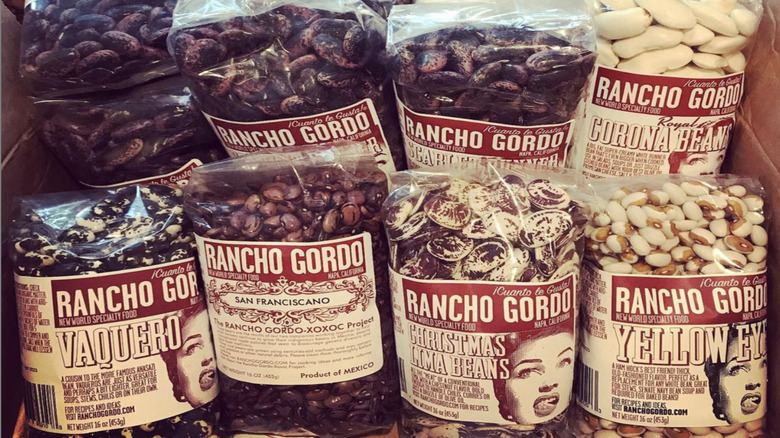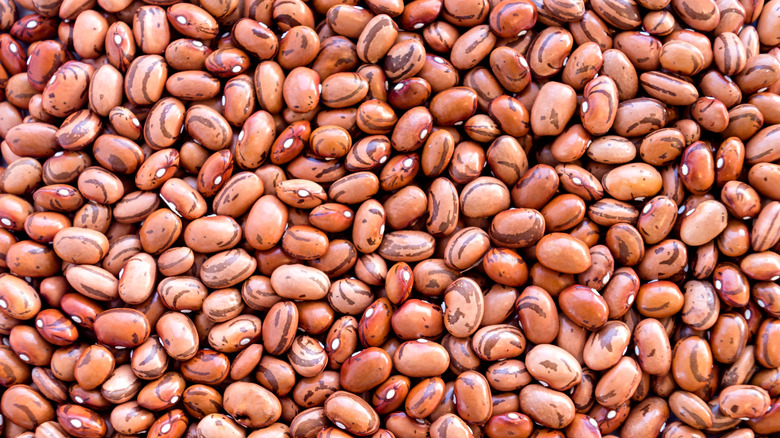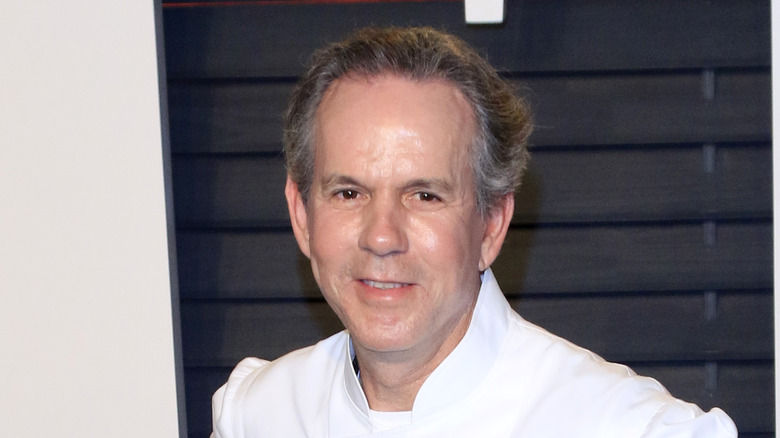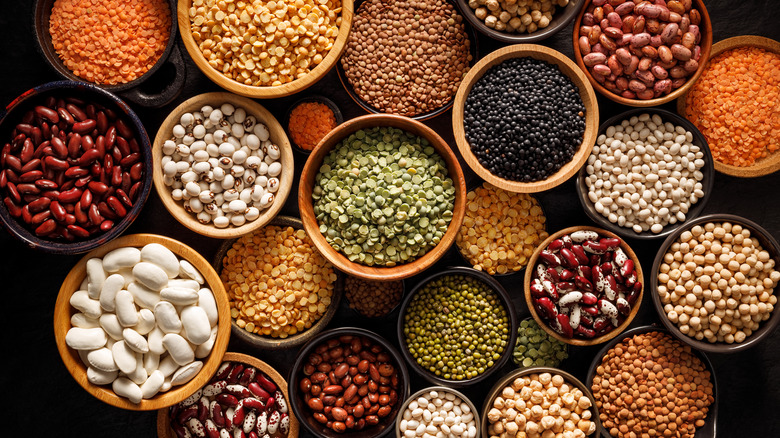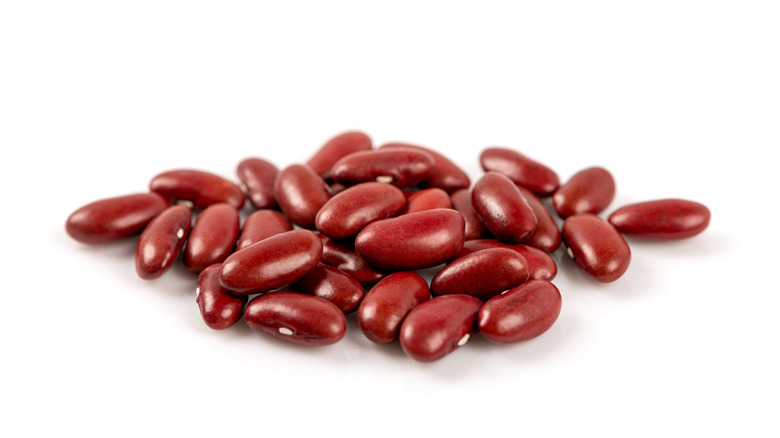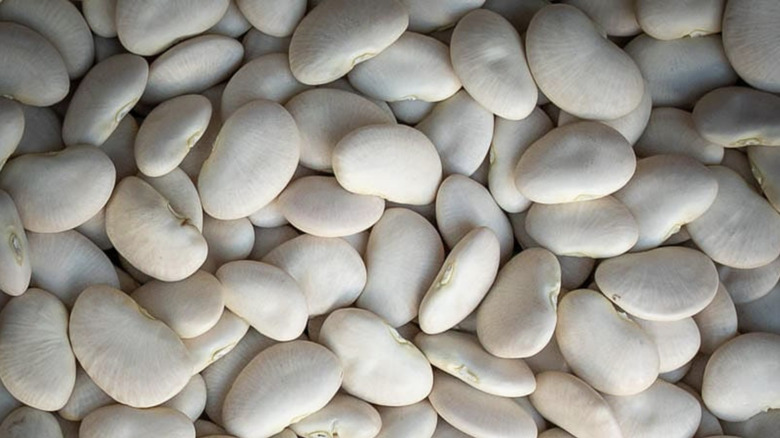What You Didn't Know About Rancho Gordo
When it comes to dried beans, chefs across the country agree: Rancho Gordo, a specialty bean grower based in Napa, California, is the bee's knees. From Thomas Keller to Emeril Lagasse, the pros can't get enough of founder and owner Steve Sando's heirloom varieties of legumes, from Christmas lima beans to black caviar lentils (via Napa Valley Register).
Today, Rancho Gordo is a bonafide success story, its beans appearing on plates across the country, from The French Laundry in Napa Valley, California to New York's Blue Hill at Stone Barns (via The New York Times). Restaurant chefs aren't the only ones going wild for Sando's offerings: home cooks also love Rancho Gordo beans, and help contribute to the company's sales of about half a million pounds per year (via The New Yorker).
Owner Steve Sando's story is one of a curious home gardener turned legume impresario. Read on to get to know him — and his beans — better.
From homegrown tomatoes to blossoming beans
As The New Yorker tells it, Rancho Gordo took root in 2001. After a string of not-so-successful years bouncing between jobs, former Esprit salesman and radio host Steve Sando started experimenting with growing beans at his Napa, California home. This bean-growing project began following a newfound interest in home gardening, which itself was spurred by a less-than-inspiring experience buying tomatoes.
As Sando explains on the Rancho Gordo website, "I was shopping one August for tomatoes and, despite Napa being one of the world's most magnificent agricultural regions, all the tomatoes were from a hothouse in Holland! Worse, they were hard and pale pink instead of the ripe tomatoes I was craving. I started to grow my own tomatoes and this eventually led to beans."
Scanning seed catalogues, Sando purchased and planted a variety of heirloom beans, and found that he was pretty good at growing legumes. As he told The New Yorker, "I thought I had a gift. But really it was Napa. Anything can grow in Napa."
Attempting to pivot his green thumb into an actual business model, Sando approached the Napa farmers market to see if they'd let him set up shop. They wouldn't, so he was forced farther afield to Yountville's market, nine miles north of Napa (via The New Yorker). This twist of fate would end up playing an important role in Rancho Gordo's success.
A famous chef stops by
Though Rancho Gordo founder Steve Sando was able to find a home for his nascent bean business at the Yountville farmers market, the company's ascent to legume fame was slow at first, according to The New Yorker. In the early 2000s, many home cooks were not accustomed to cooking dried beans at home, and market shoppers were not familiar with many of Sando's initial heirloom offerings.
"People would ask, 'What's your best bean?'" he told The New Yorker. "And the subtext was: 'Beans are bad. Which is the least bad?'"
And then, one day in 2003, destiny stepped in. According to the Napa Valley Register, Thomas Keller, chef and owner of Yountville's The French Laundry — a fine dining establishment which would go on to earn its first set of three Michelin stars in 2007 — stopped by to peruse Sando's beans.
"He purchased a few bags of Vallarta beans that day," Sando told the Napa Valley Register. "And then the next week he bought a few more bags. As soon as he left, I was swarmed by people wanting to buy beans."
Keller's fated visit spurred more local interest in Sando's beans (via the Napa Valley Register). And when the chef started serving them at his restaurant, chefs around the country followed suit, prompting an uptick in sales which continues to this day.
A bean boom for Rancho Gordo
As consumers and chefs alike became more interested in Rancho Gordo's beans, other restaurant chefs got in on the action, such as ABC Bakery's Alexis Handelman and Rutherford Grill's Sheamus Feeley (via Napa Valley Register). As sales increased, Sando had to figure out how to grow more beans — many more beans. In 2003, he sold 200 pounds of heirloom bean varietals; by 2018, that figure had skyrocketed to 600,000 pounds of 35 types of dried legumes (via Napa Valley Register). In the interim, Sando approached and worked with many different types of growers, expanding his farmland into Oregon, Washington, and New Mexico (via Rancho Gordo).
Sando now sells a veritable rainbow of legumes, from creamy white alubia blancas to shiny black-and-magenta scarlet runners to cow-printed vaqueros. The company pretty much single-handedly revived American interest in and knowledge of dried bean cookery, and according to data from market research firm Mordor Intelligence, it's a trend that shows no sign of slowing down.
The return of the humble bean
Beans were once a staple in American cooking, starring in iconic regional dishes such as succotash in the south and baked beans in the north (via Southern Living). But with post-World War II industrialization of the food supply and a marked rise in new convenience foods such as TV dinners, many traditional American foods were abandoned in favor of these new, and newly affordable, shortcut options (via National Women's History Museum). This ongoing lull in bean popularity is what Rancho Gordo founder Steve Sando experienced when he started his career as a bean peddler in Yountville. But in the years since Rancho Gordo found its footing, dried beans have made a comeback in a big way.
According to The New York Times, 2020 and the coronavirus pandemic caused the sales of both dried and canned beans to shoot through the roof as shoppers stocked up on nonperishable, healthy items at the supermarket. In the article "A Boom Time for the Bean Industry," the Times reported that Rancho Gordo typically receives 150 to 200 orders a day, but that on March 14, 2020, the company received 1,669 orders, and on March 21, it received 1,450 more.
"No one ever cares about beans at all," Sando told the paper. "It's just shocking. I used to be the loneliest man at the farmer's market."
Rancho Gordo's got a lot cooking
Specialty bean provider Rancho Gordo has attained a level of fame within the food industry any company would be proud to enjoy — and it's all the more surprising when you consider that its robust sales are of the humble legume. But the secret to the company's success, it seems — other than founder Steve Sando's unbridled passion for beans — has been its diversity. Diversity in the types of beans it offers, as well as diversity in the projects it launches.
By far the company's most popular initiative, the Rancho Gordo Bean Club is a members-only subscription offering quarterly deliveries of the company's beans and grains. It's probably the most exclusive food club in the country: according to CBS News, it had 11,000 members as of winter 2020, with an additional 11,000 bean lovers on the waiting list just itching to get their hands on Rancho Gordo's unique offerings.
Ever exploring new horizons in order to expand his bean repertoire, Sando started working with small-scale Mexican farmers via the Rancho Gordo-Xococ Project (via Rancho Gordo). The collaboration has allowed Sando to bring to market heirloom varieties of Mexican beans, which benefits the growers by allowing them to pre-sell their harvest and not face the risk of taking their crops to a fickle market (via Rancho Gordo). ¡Que viva el frijol Rancho Gordo!
